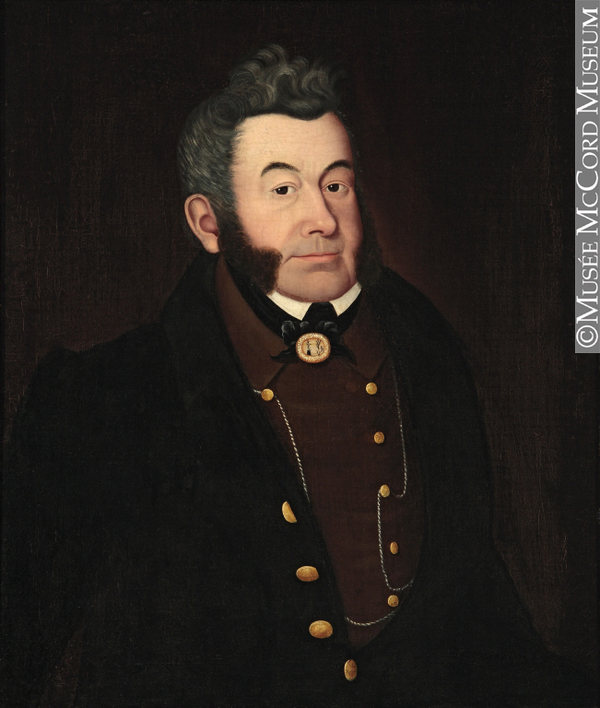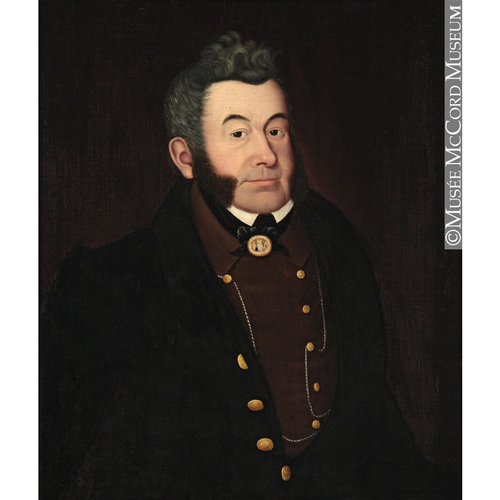
Source: Link
HERTEL DE ROUVILLE, JEAN-BAPTISTE-RENÉ, militia officer, seigneur, and politician; b. 20 June 1789 in Montreal, son of Jean-Baptiste-Melchior Hertel* de Rouville and Marie-Anne Hervieux; d. 3 Jan. 1859 in Boucherville, Lower Canada.
Like many of his forebears Jean-Baptiste-René Hertel de Rouville took up a military career early in life. He was only 18 when he obtained a commission as a lieutenant in the militia, and at 22, on 15 April 1812, he was made a captain in the Voltigeurs Canadiens. The following year he took part in the battle of Châteauguay under the command of his brother-in-law, Charles-Michel d’Irumberry* de Salaberry. He was promoted lieutenant-colonel in the Chambly battalion in 1815 and in 1816 assumed its command, replacing his father. On 3 Sept. 1816, at Boucherville, he married Charlotte de Labroquerie (Boucher de La Broquerie), who brought him a dowry of 10,000 livres. They were to have at least five children.
A little over a year after his marriage Hertel de Rouville inherited the seigneury of Rouville and part of the seigneury of Chambly under the terms of his father’s will, dated 24 Sept. 1814. The will stipulated that the properties would not pass to him until the death of his mother, which occurred on 25 Jan. 1819. Hertel de Rouville was the first seigneur in his family who chose to live on the seigneury of Rouville. He began immediately to put his manor-house into good shape, and about two years later he undertook to draw up his register of landed property. Meanwhile, he initiated negotiations for the construction of a church to replace the chapel built by his father at the end of the 18th century. The chapel had created a great deal of dissension among the censitaires of three concessions – Des Hurons, Des Étangs, and Du Bord-de-l’Eau – who disapproved of the seigneur’s visions of development. But the circumstances were different this time. The burning down of the church at Belœil in 1817 had unexpectedly obliged the neighbouring population to attend services in Hertel de Rouville’s parish. He made repeated appeals to the ecclesiastical authorities alleging that the church was too small. However, the censitaires apparently nursed their old grudges, for Hertel de Rouville did not get his way until 24 Feb. 1827, when consent was finally given for the canonical erection of Saint-Hilaire parish (at Mont-Saint-Hilaire). Even then he had to wait several years for the church to be built and the first resident parish priest to be appointed. Indeed, the parish was not incorporated until 10 July 1835.
Like his father, Hertel de Rouville could not resist the lure of politics. Elected to the House of Assembly at the age of 35, he represented Bedford riding from 28 Aug. 1824 to 2 Sept. 1830, and the new constituency of Rouville from 26 Oct. 1830 until he resigned on 10 Nov. 1832. During his first term the Quebec and Montreal voters decided in the winter of 1827–28 to send petitions to the king denouncing the abuses of the government led by Lord Dalhousie [Ramsay*]. The submission from Montreal was particularly bitter, for the first part contained a long series of charges against the head of the executive, followed by an urgent demand for his recall. Torn between his responsibilities as a soldier and as an assemblyman, Hertel de Rouville none the less decided to sign the petition. The response was immediate: on 25 Feb. 1828 he learned through the newspapers that he had been stripped of his rank by a general militia order, as had four other officers likewise compromised by the petition. The incident was heatedly discussed on 6 March at a meeting of county committees of the Montreal region. It resolved to denounce this new abuse of power by the governor and to inform the province’s agents in England so they could make the matter known to the king. The affair was not settled until the summer of 1828, with the departure of Lord Dalhousie.
Hertel de Rouville was appointed to the Legislative Council, where he sat from 22 Aug. 1837 to 27 March 1838. This honour did not prevent him from being attacked by the parish priest of Saint-Jean-Baptiste-de-Rouville, Louis Nau*. Nau issued a sworn statement on 8 Nov. 1838 that accused him not only of supporting rebel activity in his region, but also of provoking new disturbances, and even of supplying “one hundred and fifty louis to provide the revolutionaries with arms.” On 5 Oct. 1839 Nau told the rebellion losses commissioners, who were examining Hertel de Rouville’s claims, it was his duty to inform them that the day before “an address and several statements and another authentic document which prove the disloyalty of the said De Rouville were presented to His Excellency, with a view to assisting the just and honest progress of His Majesty’s government.” To such testimonies was added that of the police magistrate William Foster Coffin*, who had no sympathy for the seigneur of Rouville.
These statements seem to have had a decisive influence on the British authorities, who from then on were guarded in their attitude towards Hertel de Rouville. Yet he had unhesitatingly provided board and lodging for the troops in the county; moreover, in his correspondence with British officers he continued to offer his services and to testify to his loyalty. For example, in a letter to Major Thomas Leigh Goldie dated 14 June 1839 he asserted, “Although my name and Christian names are French or Canadian, . . . I am and . . . I have always been as good, and perhaps a better, subject of His Britannic Majesty than all those who have names with O and Mac [in them], and all other English, Irish and Scottish names. . . . I am far from being the man people have tried . . . to persuade [the governor] that I was and that he believes I am.”
But Jean-Baptiste-René Hertel de Rouville would never be the same again. He was uneasy, tense, and withdrawn, which made his relations with those around him very difficult. Furthermore, his business affairs were going badly. Soon, having fallen ill, he instructed his son-in-law Dr Jean-Baptiste Brousseau of Belœil to sell the seigneury of Rouville, and he left his manor-house and went to live with his son, Jean-Baptiste-René-Jacques, at Sorel. The sale to Major Thomas Edmund Campbell* was completed on 16 April 1844 for 17,000 livres. On 1 Feb. 1855, after his wife’s death, Hertel de Rouville, who was ill again and in debt, sold the seigneury of Lac-Mitis to three English-speaking businessmen: Alfred Gill of Hartford, Conn., Cartland Starr of Boston, and Samuel Eastman Crocker. He is believed to have made his home with his daughter Marie-Anne-Charlotte at Belœil in 1858. According to the burial certificate, Hertel de Rouville died at Boucherville on 3 Jan. 1859 and was interred there five days later.
AC, Beauharnois (Valleyfield), Minutiers, Ovide Leblanc, 16 avril 1844. ANQ-M, CE1-22, 3 sept. 1816, 8 janv. 1859; CE1-51, 20 juin 1789; CN1-43, 24 sept. 1814; CN3-29, 1er févr. 1855. ANQ-Q, E17/44, nos.3564, 3595–96, 3597–98a, 3599–600; E17/45, nos.3601, 3603a. Carom “Inv. de la corr. de Mgr Panet,” ANQ Rapport, 1933–34: 293, 322, 341, 344, 347–48; 1934–35: 397, 401, 406–7; 1935–36: 170, 172–73, 233, 260. Desrosiers, “Inv. de la corr. de Mgr Lartigue,” ANQ Rapport, 1944–45: 182, 209. Turcotte, Le Conseil législatif. Armand Cardinal, Histoire de Saint-Hilaire; les seigneurs de Rouville (Montréal, 1980). P.-G. Roy, “Biographies canadiennes,” BRH, 21 (1915): 53–54.
Cite This Article
Serge Courville, “HERTEL DE ROUVILLE, JEAN-BAPTISTE-RENÉ,” in Dictionary of Canadian Biography, vol. 8, University of Toronto/Université Laval, 2003–, accessed November 21, 2024, https://www.biographi.ca/en/bio/hertel_de_rouville_jean_baptiste_rene_8E.html.
The citation above shows the format for footnotes and endnotes according to the Chicago manual of style (16th edition). Information to be used in other citation formats:
| Permalink: | https://www.biographi.ca/en/bio/hertel_de_rouville_jean_baptiste_rene_8E.html |
| Author of Article: | Serge Courville |
| Title of Article: | HERTEL DE ROUVILLE, JEAN-BAPTISTE-RENÉ |
| Publication Name: | Dictionary of Canadian Biography, vol. 8 |
| Publisher: | University of Toronto/Université Laval |
| Year of publication: | 1985 |
| Year of revision: | 1985 |
| Access Date: | November 21, 2024 |



